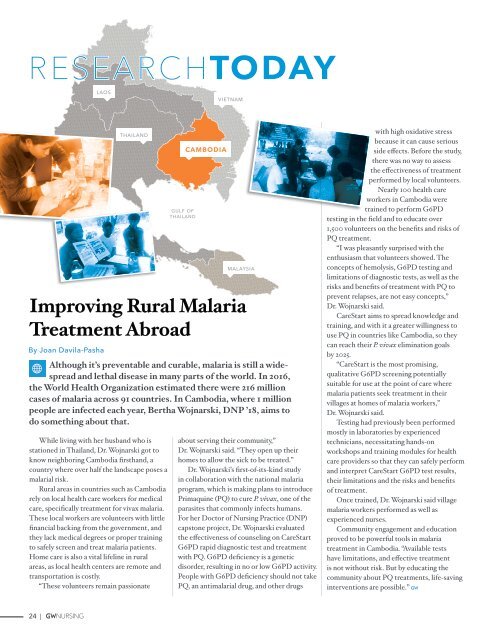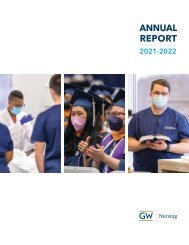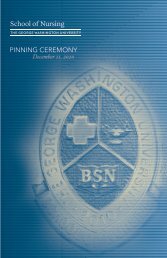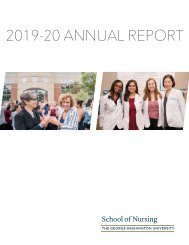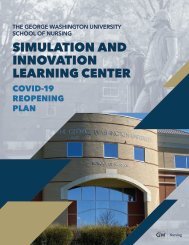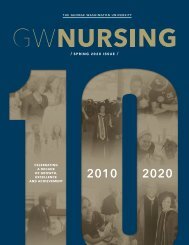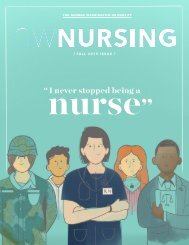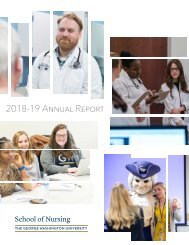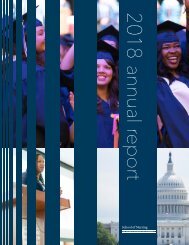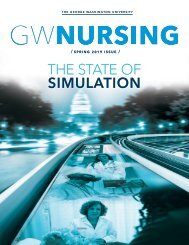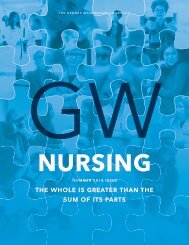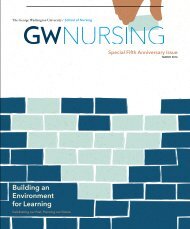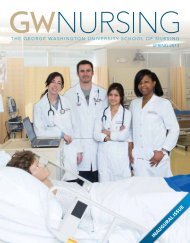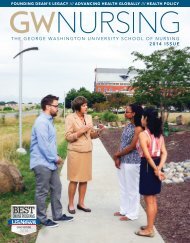GW Nursing Magazine Fall 2018
GW Nursing is a publication of the George Washington University School of Nursing. The magazine tells the story of GW nurses and their endeavors in the areas of education, research, policy and practice.
GW Nursing is a publication of the George Washington University School of Nursing. The magazine tells the story of GW nurses and their endeavors in the areas of education, research, policy and practice.
You also want an ePaper? Increase the reach of your titles
YUMPU automatically turns print PDFs into web optimized ePapers that Google loves.
esearchtoday<br />
laos<br />
vietnam<br />
Improving Rural Malaria<br />
Treatment Abroad<br />
By Joan Davila-Pasha<br />
thailand<br />
Although it’s preventable and curable, malaria is still a widespread<br />
and lethal disease in many parts of the world. In 2016,<br />
the World Health Organization estimated there were 216 million<br />
cases of malaria across 91 countries. In Cambodia, where 1 million<br />
people are infected each year, Bertha Wojnarski, DNP ’18, aims to<br />
do something about that.<br />
While living with her husband who is<br />
stationed in Thailand, Dr. Wojnarski got to<br />
know neighboring Cambodia firsthand, a<br />
country where over half the landscape poses a<br />
malarial risk.<br />
Rural areas in countries such as Cambodia<br />
rely on local health care workers for medical<br />
care, specifically treatment for vivax malaria.<br />
These local workers are volunteers with little<br />
financial backing from the government, and<br />
they lack medical degrees or proper training<br />
to safely screen and treat malaria patients.<br />
Home care is also a vital lifeline in rural<br />
areas, as local health centers are remote and<br />
transportation is costly.<br />
“These volunteers remain passionate<br />
gulf of<br />
thailand<br />
cambodia<br />
malaysia<br />
about serving their community,”<br />
Dr. Wojnarski said. “They open up their<br />
homes to allow the sick to be treated.”<br />
Dr. Wojnarski’s first-of-its-kind study<br />
in collaboration with the national malaria<br />
program, which is making plans to introduce<br />
Primaquine (PQ) to cure P. vivax, one of the<br />
parasites that commonly infects humans.<br />
For her Doctor of <strong>Nursing</strong> Practice (DNP)<br />
capstone project, Dr. Wojnarski evaluated<br />
the effectiveness of counseling on CareStart<br />
G6PD rapid diagnostic test and treatment<br />
with PQ. G6PD deficiency is a genetic<br />
disorder, resulting in no or low G6PD activity.<br />
People with G6PD deficiency should not take<br />
PQ, an antimalarial drug, and other drugs<br />
with high oxidative stress<br />
because it can cause serious<br />
side effects. Before the study,<br />
there was no way to assess<br />
the effectiveness of treatment<br />
performed by local volunteers.<br />
Nearly 100 health care<br />
workers in Cambodia were<br />
trained to perform G6PD<br />
testing in the field and to educate over<br />
1,500 volunteers on the benefits and risks of<br />
PQ treatment.<br />
“I was pleasantly surprised with the<br />
enthusiasm that volunteers showed. The<br />
concepts of hemolysis, G6PD testing and<br />
limitations of diagnostic tests, as well as the<br />
risks and benefits of treatment with PQ to<br />
prevent relapses, are not easy concepts,”<br />
Dr. Wojnarski said.<br />
CareStart aims to spread knowledge and<br />
training, and with it a greater willingness to<br />
use PQ in countries like Cambodia, so they<br />
can reach their P. vivax elimination goals<br />
by 2025.<br />
“CareStart is the most promising,<br />
qualitative G6PD screening potentially<br />
suitable for use at the point of care where<br />
malaria patients seek treatment in their<br />
villages at homes of malaria workers,”<br />
Dr. Wojnarski said.<br />
Testing had previously been performed<br />
mostly in laboratories by experienced<br />
technicians, necessitating hands-on<br />
workshops and training modules for health<br />
care providers so that they can safely perform<br />
and interpret CareStart G6PD test results,<br />
their limitations and the risks and benefits<br />
of treatment.<br />
Once trained, Dr. Wojnarski said village<br />
malaria workers performed as well as<br />
experienced nurses.<br />
Community engagement and education<br />
proved to be powerful tools in malaria<br />
treatment in Cambodia. “Available tests<br />
have limitations, and effective treatment<br />
is not without risk. But by educating the<br />
community about PQ treatments, life-saving<br />
interventions are possible.”<br />
24 |


